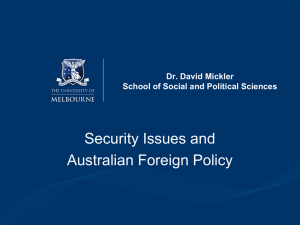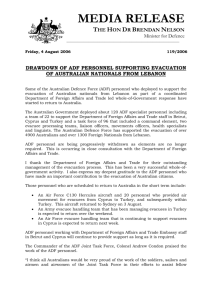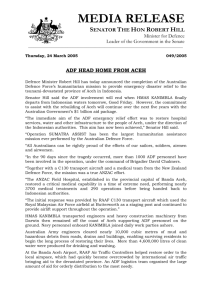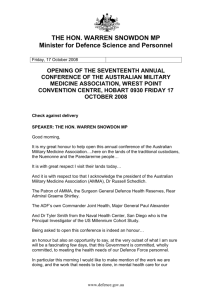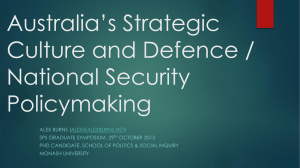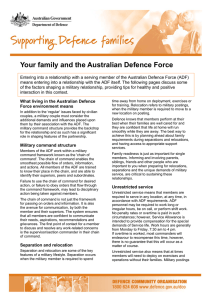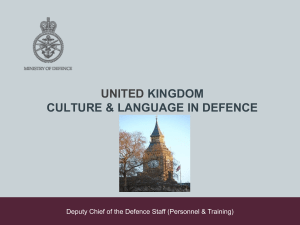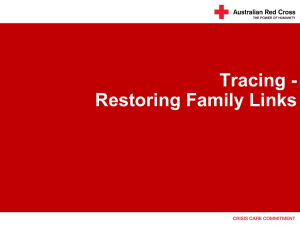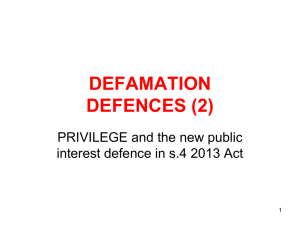Poster (MS Powerpoint 2007 1MB)
advertisement
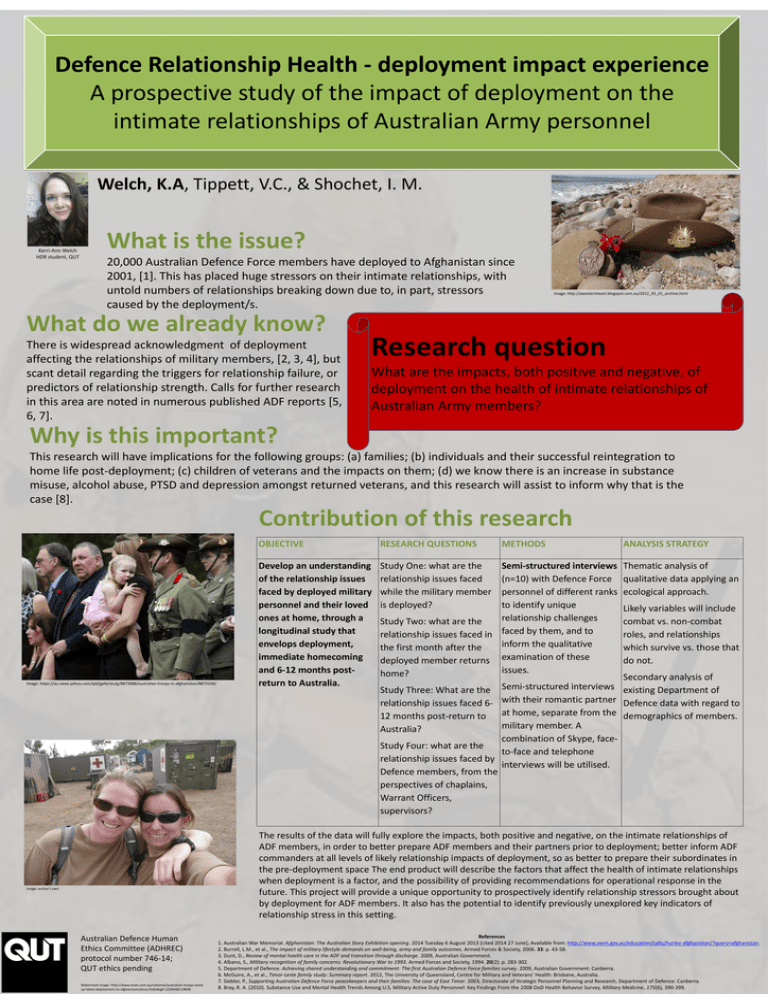
Defence Relationship Health - deployment impact experience A prospective study of the impact of deployment on the intimate relationships of Australian Army personnel Welch, K.A, Tippett, V.C., & Shochet, I. M. Kerri-Ann Welch HDR student, QUT What is the issue? 20,000 Australian Defence Force members have deployed to Afghanistan since 2001, [1]. This has placed huge stressors on their intimate relationships, with untold numbers of relationships breaking down due to, in part, stressors caused by the deployment/s. What do we already know? There is widespread acknowledgment of deployment affecting the relationships of military members, [2, 3, 4], but scant detail regarding the triggers for relationship failure, or predictors of relationship strength. Calls for further research in this area are noted in numerous published ADF reports [5, 6, 7]. Image: http://awesternheart.blogspot.com.au/2012_05_01_archive.html Image: http://awesternheart.blogspot.com.au/2012_05_01_archive.html Research question What are the impacts, both positive and negative, of deployment on the health of intimate relationships of Australian Army members? Why is this important? This research will have implications for the following groups: (a) families; (b) individuals and their successful reintegration to home life post-deployment; (c) children of veterans and the impacts on them; (d) we know there is an increase in substance misuse, alcohol abuse, PTSD and depression amongst returned veterans, and this research will assist to inform why that is the case [8]. Contribution of this research Image: https://au.news.yahoo.com/qld/galleries/g/8873088/australian-troops-in-afghanistan/8873104/ OBJECTIVE RESEARCH QUESTIONS Develop an understanding of the relationship issues faced by deployed military personnel and their loved ones at home, through a longitudinal study that envelops deployment, immediate homecoming and 6-12 months postreturn to Australia. Study One: what are the relationship issues faced while the military member is deployed? METHODS Semi-structured interviews (n=10) with Defence Force personnel of different ranks to identify unique relationship challenges Study Two: what are the relationship issues faced in faced by them, and to inform the qualitative the first month after the deployed member returns examination of these issues. home? ANALYSIS STRATEGY Thematic analysis of qualitative data applying an ecological approach. Likely variables will include combat vs. non-combat roles, and relationships which survive vs. those that do not. Secondary analysis of Study Three: What are the Semi-structured interviews existing Department of relationship issues faced 6- with their romantic partner Defence data with regard to at home, separate from the demographics of members. 12 months post-return to military member. A Australia? combination of Skype, faceStudy Four: what are the to-face and telephone relationship issues faced by interviews will be utilised. Defence members, from the perspectives of chaplains, Warrant Officers, supervisors? The results of the data will fully explore the impacts, both positive and negative, on the intimate relationships of ADF members, in order to better prepare ADF members and their partners prior to deployment; better inform ADF commanders at all levels of likely relationship impacts of deployment, so as better to prepare their subordinates in the pre-deployment space The end product will describe the factors that affect the health of intimate relationships when deployment is a factor, and the possibility of providing recommendations for operational response in the future. This project will provide a unique opportunity to prospectively identify relationship stressors brought about by deployment for ADF members. It also has the potential to identify previously unexplored key indicators of relationship stress in this setting. Image: author’s own Australian Defence Human Ethics Committee (ADHREC) protocol number 746-14; QUT ethics pending Watermark image: http://www.news.com.au/national/australian-troops-windup-latest-deployment-to-afghanistan/story-fndo4eg9-1226448119838 References 1. Australian War Memorial. Afghanistan: The Australian Story Exhibition opening. 2014 Tuesday 6 August 2013 [cited 2014 27 June]; Available from: http://www.awm.gov.au/education/talks/hurley-afghanistan/?query=afghanistan. 2. Burrell, L.M., et al., The impact of military lifestyle demands on well-being, army and family outcomes. Armed Forces & Society, 2006. 33: p. 43-58. 3. Dunt, D., Review of mental health care in the ADF and transition through discharge. 2009, Australian Government. 4. Albano, S., Military recognition of family concerns: Revolutionary War to 1993. Armed Forces and Society, 1994. 20(2): p. 283-302. 5. Department of Defence. Achieving shared understanding and commitment: The first Australian Defence Force families survey. 2009, Australian Government: Canberra. 6. McGuire, A., et al., Timor-Leste family study: Summary report. 2012, The University of Queensland, Centre for Military and Veterans' Health: Brisbane, Australia. 7. Siebler, P., Supporting Australian Defence Force peacekeepers and their families: The case of East Timor. 2003, Directorate of Strategic Personnel Planning and Research, Department of Defence: Canberra. 8. Bray, R. A. (2010). Substance Use and Mental Health Trends Among U.S. Military Active Duty Personnel: Key Findings From the 2008 DoD Health Behavior Survey. Military Medicine, 175(6), 390-399.
